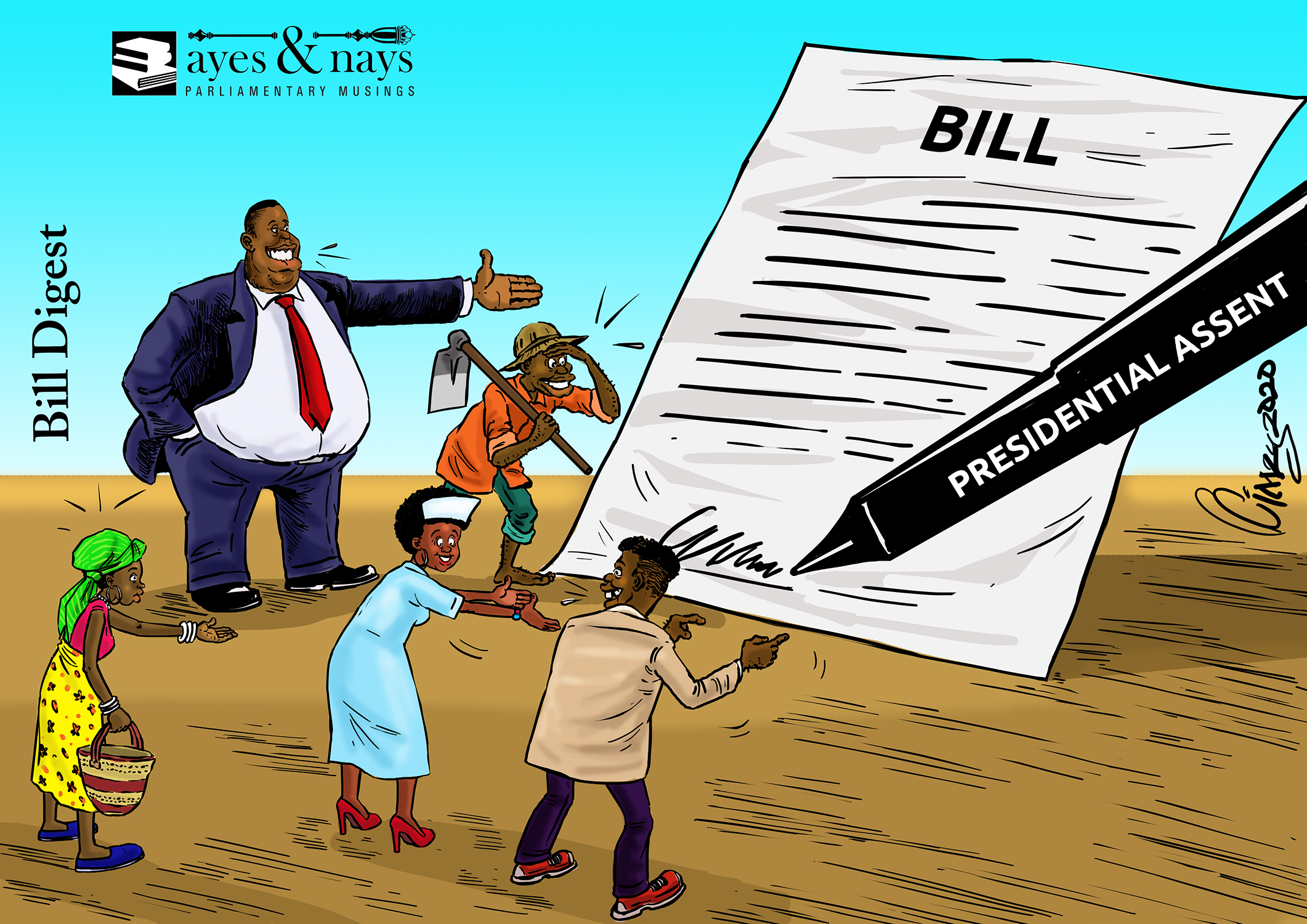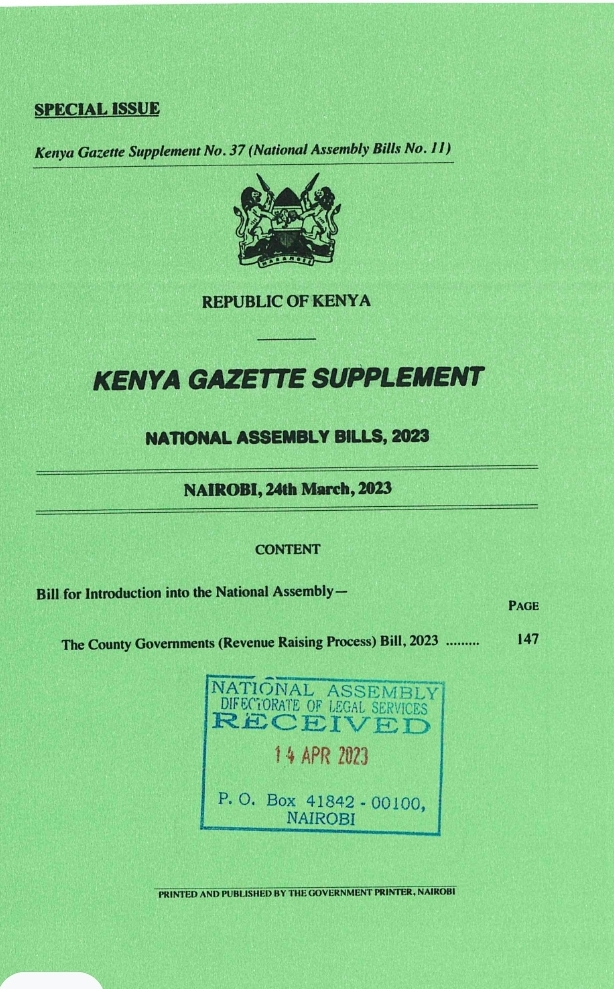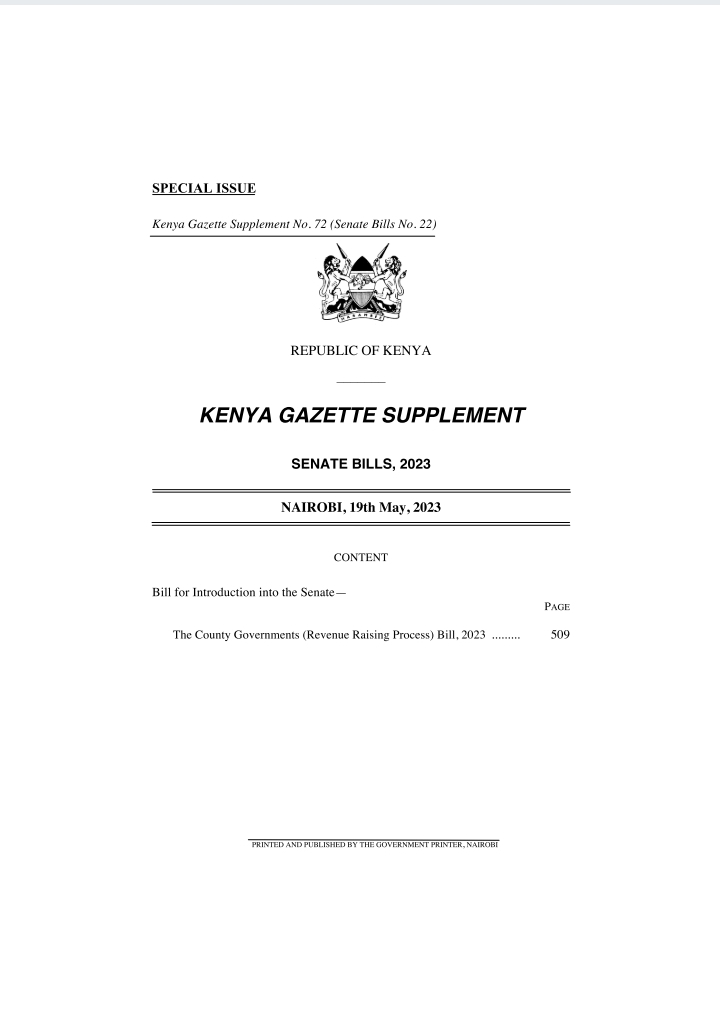
About the Bill
The County Governments (Revenue Raising Process) Bill, 2023 (National Assembly Bills No. 11 of 2023) is a National Assembly Bill sponsored by the National Assembly Leader of Majority Party. It was published on 24th March, 2023 and it was read for a first time on 4th May, 2023. It was then committed to the Departmental Committee on Finance and National Planning for consideration.
Highlights of the Bill

The Bill gives effect to the constitutional requirement of Article 209(5) of the Constitution by defining the manner in which the national government, through the National Treasury may exercise its policy oversight role and it establishes the process whereby the county governments may exercise their taxation authority.
Article 209 of the Constitution provides as follows—
209.Power to impose taxes and charges
(1) Only the national government may impose—
(a) income tax;
(b) value-added tax;
(c) customs duties and other duties on import and export goods; and
(d) excise tax.
(2) An Act of Parliament may authorise the national government to impose any other tax or duty, except a tax specified in clause (3) (a) or (b).
(3) A county may impose—
(a) property rates;
(b) entertainment taxes; and
(c) any other tax that it is authorised to impose by an Act of Parliament.
(4) The national and county governments may impose charges for services.
(5) The taxation and other revenue-raising powers of a county shall not be exercised in a way that prejudices national economic policies, economic activities across county boundaries or the national mobility of goods, services, capital or labour.
The Bill further regulates the exercise by county governments of their power to impose taxes, levies and duties by providing for the compliance by a proposed county government tax, fee, levy or charge with the Constitution and the provisions of this Bill and to ensure that county government proposals are dealt with in accordance with Article 6(2) of the Constitution.
Article 6(2) of the Constitution provides as follows—
6. (2) The governments at the national and county levels are distinct and inter-dependent and shall conduct their mutual relations on the basis of consultation and cooperation.
The Bill does not set specific taxes that a county government may enact. Responsibility for initiating a county government tax proposal rest with county government and they may propose any tax in accordance with the Constitution. Rather, the Bill regulates the process by which county government taxes are imposed.
Clause 2 of the Bill provides for the definitions of words or expressions used in the Bill in technical sense.
Clause 3 of the Bill restates Article 209(5) of the Constitution, noting that a county government tax shall not materially or unreasonably prejudice national economic policies, economic activities across county boundaries or the national mobility of goods, services, capital or labour. It also requires county government taxes to be consistent with co-operative governance as outlined in Article 6(2) of the Constitution, tariff and pricing as provided for under section 120 of the County Government Act, 2012 and that where a fee is proposed to be introduced for a service, it does not exceed the cost of providing such service.
Section 120 of the County Governments Act, 2012 provides as follows—
120. Tariffs and pricing of public services
(1) A county government or any agency delivering services in the county shall adopt and implement a tariffs and pricing policy for the provision of public services.
(1A) Notwithstanding subsection (1), a county government or any agency delivering services in the county shall adopt and implement tariffs and pricing policy subject to the existing National Government laws and policies.
(2) A county government or agency delivering services through service delivery agreements, shall comply with the provisions of this section.
(3) A tariff policy adopted under subsection (1) shall reflect the following guidelines—
(a) users of county services should be treated equitably in the application of tariffs, fees, levies or charges;
(b) the amount individual users pay for services should generally be in proportion to their use of that service;
(c) poor households shall have access to at least basic services through—
(i) tariffs that cover only operating and maintenance costs;
(ii) special tariffs or life line tariffs for low levels of use or consumption of services or for basic levels of service; or
(iii) any other direct or indirect method of subsidies of tariffs for poor households;
(d) tariffs shall reflect the costs reasonably associated with rendering the service, including capital, operating, maintenance, administration and replacement costs, and interest charges;
(e) tariffs shall be set at levels that facilitate the financial sustainability of the service, taking into account subsidy from sources other than the service concerned;
(f) provision may be made in appropriate circumstances for a surcharge on the tariff for a service;
(g) provision may be made for the promotion of local economic development through special tariffs for categories of commercial and industrial users;
(h) promotion of the economic, efficient, effective and sustainable use of resources, the recycling of waste and other appropriate environmental objectives; and
(i) full disclosure of the subsidies on tariffs for poor households and other categories of users.
(4) A tariff policy may differentiate between different categories of users, debtors, service providers, services, service standards, geographical areas and other matters as long as the differentiation does not amount to unfair discrimination.
(5) A county government may make laws and regulations to give effect to the implementation and enforcement of tariff policies.
Clause 4 of the Bill provides for the process of introduction of county government tax and other revenue raising measures. It requires county governments to submit tax proposals to the National Treasury and Commission on Revenue Allocation for approval.
Clause 5 of the Bill contains provisions relating to waivers and variations. It states that a tax or a licensing fee including a fine or a penalty may not be varied except by legislation.
Clause 6 of the Bill states that the Kenya Revenue Authority may be the collecting agent for a county government tax in accordance with section 160 of the Public Finance Management Act, 2012.
Section 160 of the Public Finance Management Act, 2012, provides as follows—
160. Kenya Revenue Authority may be appointed collector
The County Executive Committee member for finance may authorise the Kenya Revenue Authority or appoint a collection agent to be a collector of county government revenue for the purposes of this Part on such terms and conditions as may be agreed in writing in accordance with regulations.
Clause 7 of the Bill provides for transitional provisions. It provides that any county tax or any revenue raising measures including waivers and variations imposed by a concerned county prior to commencement of the Act shall be deemed to have been imposed, waived or varied in accordance with the Act unless they are not in compliance with Article 209(5) of the Constitution. It also provides that within 3 months upon commencement of the Act, county governments shall submit a list of all taxes, fees and charges imposed prior to the commencement of the Act to the Cabinet Secretary for onward transmission to the Inter-Agency Transitional Committee established under section 8 for review.
Clause 8 of the Bill contains provisions for establishment and composition of the Inter-Agency Transitional Committee by the Cabinet Secretary for the purpose of reviewing all fees and charges imposed by the county governments prior to commencement of the Act. The composition of the Committee is as follows—
- the National Treasury;
- the Commission on Revenue Allocation;
- Intergovernmental Relations Technical Committee;
- Council of Governors; and
- the Kenya Revenue Authority.
Clause 9 of the Bill contains provisions on functions of the Committee established for the purpose of reviewing all fees and charges imposed by the county governments prior to commencement of the Act.
Clause 10 of the Bill provides for the duration of the Committee which shall be for a period of two years or more as may be determined by the Cabinet Secretary from the time of its establishment.
Clause 11 of the Bill empowers the Cabinet Secretary to make Regulations for implementation of the Act.
How do you submit your views?
The Bill has been committed to the Departmental Committee on Finance and National Planning of the National Assembly which is considering it and will table its report. Pursuant to standing order 127(3) of the National Assembly Standing Orders, the Committee shall facilitate public participation and shall take into account the views and recommendations of the public when the committee considers the Bill.
In addition, pursuant to standing order 127(4) of the National Assembly Standing Orders, the Committee is required to submit its report to the House within thirty calendar days of the committal of the Bill to the Committee.
Members of the public may submit any comments on the Bill to the Office of the Clerk of the National Assembly, 1st Floor, Main Parliament Buildings, Nairobi, Kenya, through P.O. Box 41842-00100, Nairobi, Kenya or email cna@parliament.go.ke.
Similar Senate Bill

The Senate has also published a similar Bill. The County Governments (Revenue Raising Process) Bill, 2023 (Senate Bills No. 22 of 2023) is a Senate Bill sponsored by the Senate Leader of Majority Party. It was published on 19th May, 2023 and it was read for a first time on 27th June, 2023 and committed to the Senate Standing Committee on Finance and Budget.
The Senate Bill’s principal object, as provided in the memorandum of objects and reasons, is to give effect to the constitutional requirement under Article 209(5) of the Constitution which requires taxation and other revenue raising powers of a county not to be exercised in a way that prejudices national economic policies, economic activities across county boundaries or the national mobility of goods, services, capital or labour.
The Bill achieves this by regulating the exercise by county governments of their power to impose taxes, charges, levies and fees by providing that a proposed county government tax, fees, levy or charge be in compliance with the Constitution and the provisions of the Bill. However, the Bill does not set specific taxes that a county government may impose. Responsibility for initiating a county government tax proposal rest with the county government and they may propose any tax in accordance with the Constitution.
Clause 2 of the Bill provides for the definitions of words or expressions used in the Bill.
Clause 3 of the Bill restates Article 209(5) of the Constitution, noting that a county government tax shall not materially or unreasonably prejudice national economic policies, economic activities across county boundaries or the national mobility of goods, services, capital or labour. It also requires county government taxes to be consistent with co-operative governance as outlined in Article 6(2) of the Constitution, tariff and pricing as provided for under section 120 of the County Government Act, 2012 and that where a fee is proposed to be introduced for a service, it does not exceed the cost of providing such service.
Clause 4 of the Bill provides for the establishment of an Inter-Agency Committee on County Taxes and the functions of the Committee which is reviewing all fees and charges imposed by the county governments.
Clause 5 of the Bill provides for the process of introduction of county government tax and other revenue measures. It requires county governments to submit tax proposals to the Inter-Agency Committee on County Taxes for approval.
Clause 6 of the Bill contains provisions relating to waivers and variations. It states that a tax or a licensing fee including a fine or a penalty may not be varied except by legislation.
Clause 7 of the Bill provides that a county government may engage the Kenya Revenue Authority or any other person as a collecting agent for a county government tax in accordance with section 160 of the Public Finance Management Act, 2012.
Clause 8 of the Bill provides that taxes currently imposed by county governments are deemed to have been imposed in terms of the Bill unless they are not in compliance with Article 209(5). However, within one year from the date of commencement of the law, county governments shall submit a list of all taxes to the Committee for purposes of reviewing such taxes so as to ensure compliance with the Constitution.
Clause 9 of the Bill provides for dispute resolution where the national and county governments fail to agree on a proposed imposition or revision of a tax, fee or charge. Such a dispute shall be resolved in accordance with Part IV of the Intergovernmental Relations Act on resolution of disputes.
Clause 10 of the Bill gives the Cabinet Secretary powers to make Regulations for better implementation of the Act.
Listen to this post:
_
ayes & nays
